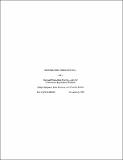One for you, three for me, or, optimal production sharing rules for a petroleum exploration venture
Author(s)
Hampson, Philip Robert Osler; Parsons, John E.; Blitzer, Charles R.
Download28596007.pdf (1.459Mb)
Metadata
Show full item recordAbstract
This is a case study in the design of the
production sharing rule used in an oil exploration partnership contract. The contract was
negotiated in mid-1986 when a state-owned oil resources authority hired a U.S. oil company
to explore and develop a defined territory owned by the authority. The company was given a
share in production so that it would have a financial incentive to pursue an exploration and
development program that maximizes the net return to the authority. We use the Grossman and
Hart (1983) principal-agent model to improve on the shape and calibration of the sharing
rule. In comparison with the actual contract, the optimal rule assigns the company a larger
share of the small discoveries and the company's share decreases significantly as the size
of the discoveries increases. The optimal sharing rule increases the expected return on the
project to the authority by $7.8 million, or 6% of the $129 million net present value that
the authority would enjoy under the actual contract. The increased NPV is a result of
improving incentives for the choice of an optimal exploration program on the part of the
company, and ensuring that the company enjoys an interest in completing marginally
profitable wells.
Date issued
1990Publisher
MIT Center for Energy and Environmental Policy
Research
Other identifiers
90-001
Series/Report no.
Working paper (Massachusetts Institute of
Technology. Center for Energy Policy Research) ; MIT-CEPR 90-001.